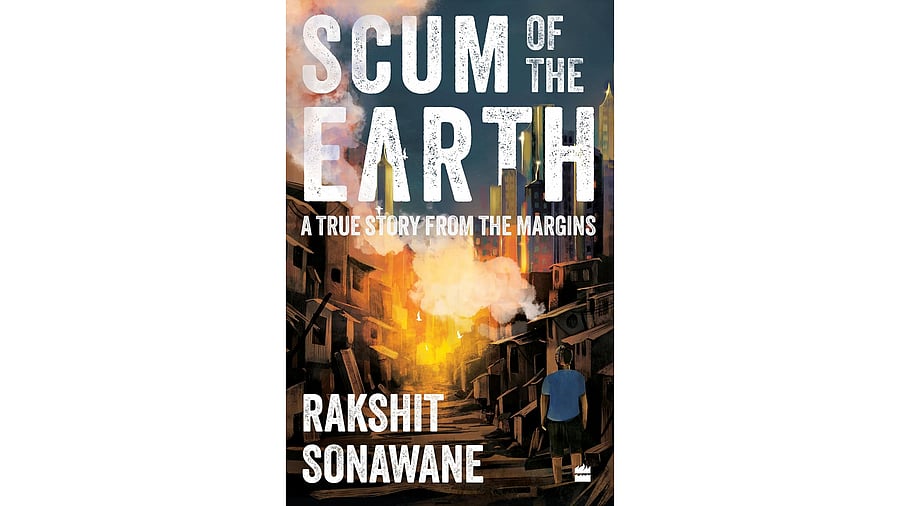
Scum of the Earth
Credit: Special arrangement
Breaking free from the shackles of tradition is not an easy option for a sensitive individual from a marginalised caste. Education, idealism, hard work and honesty are not enough to gain acceptance by society at large. Despite claims to the contrary, caste prejudices still linger even in cosmopolitan Mumbai.
The protection that the Constitution offers to the underprivileged does not go very far in the era of liberalisation. These are the issues that crop up in Scum of the Earth, a true story from the margins, a debut novel by veteran Mumbai journalist Rakshit Sonawane.
Written in ‘bits and pieces’ over several years, the work encapsulates the journey of Avinash, a Dalit boy born in a Mumbai slum, and his parents, Dagadoo and Godavari. Dagadoo, a convert to Buddhism and follower of Ambedkar, migrated from his village to Mumbai to ensure a life with dignity for his son. The teachings of Buddha and Ambedkar’s life guided the family. It is a saga of survival against odds, a dogged fight against poverty, humiliation and greed. However, there is a price to pay for living with dignity.
The incidents narrated in the semi-autobiographical work are heavily drawn from the author’s own experience. After landing a job in the docks, narrator Avinash finds the place a den of corruption. He is advised to learn the tricks to make some extra money, work like others and enjoy life. Refusal to fall in line makes him a marked man and a thorn in the flesh of greedy staff members and security men colluding with unscrupulous businessmen. He is steadfast in his criticism of the corrupt, irrespective of the consequences.
Avinash’s first visit to his ancestral village leaves an indelible mark on his psyche. The sight of Dalit families being relegated to the outskirts despite the progress made is hard for him to stomach. Cosmopolitan Mumbai always fascinated Avinash, but a closer look reveals it as a make-believe, deceptive world with its own rules and regulations. He comes to realise how ugly and unscrupulous it is. While Scum of the Earth tells the story of one man’s journey from the margins to the mainstream, it is also the tale of Mumbai’s underclass.
Avinash is no rebel. But he refuses to follow the traditions of his ancestors who languished in poverty, illiteracy and servility. He believes he has a different life protected by the Constitution. He wants to overcome his limitations with hard work and honesty instead of whining about what others have. That greed cuts across caste lines is a revelation for him. He is astonished by how the oppressed act like the oppressor when they are empowered. He wants them to outshine their oppressors by efficiency and sincerity and set an example to cleanse the system. Also, the spectacle of members of backward castes becoming drum-beaters of majoritarianism baffles him.
Right from his school days, Avinash has been exposed to the reality of the caste divide, with taunts from classmates being a constant. Later, he is shocked to learn that even glitzy newsrooms are not free from the bias shown by the elite castes. While working in the docks, he nurses an ambition of becoming a journalist as a watchdog of democracy. Although well qualified, he is turned away by editors. One is candid to tell him: ‘’This is a specialised job that requires a lot of intelligence, knowledge and an analytical mind. This profession is not for you people.’’
As a reporter, he is advised to develop contacts and make extra money. Certain beats are out of bounds for him. Scoffing at his suggestion to do a story on the redevelopment of defunct textile mills’ land, his editor suggests stories on celebrities’ lifestyles to garner more advertising revenue. Avinash also learns that not all journalists are upright. Later, when he gets an opportunity to lead a team of reporters, all four of his team members put in their papers. But he is undeterred.
Scum of the Earth holds a mirror to contemporary India’s fault lines, where the caste bias of traditional privileged castes is very much alive, in subtler forms. He reminds Ambedkarites not to forget the struggles of the past and not to take reservations for granted.
As a novel, Scum of the Earth has its limitations. It is akin to reportage focusing on socio-political issues rather than a story with a well-knit plot and compelling characters. Critique of social evils and yearning for an egalitarian society alone cannot create a good novel.